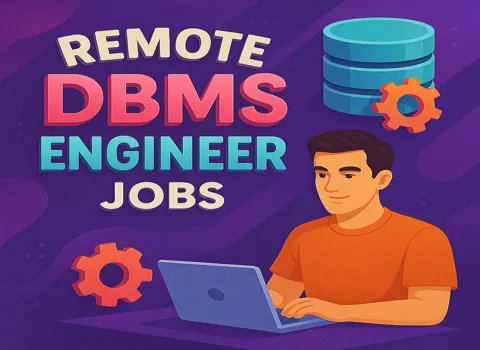Remote DBMS Engineer
Description
Remote DBMS Engineer
Help Us Build the Future of Data—From Anywhere
Do you find excitement in solving real-world data puzzles, designing reliable infrastructure, and making sure that every query runs smoothly? As a Remote DBMS Engineer, you’ll play an essential role in creating and refining the digital backbone for companies around the world. Step into a position where your work supports the tools and products that millions rely on, all from the comfort of your favorite workspace. Suppose you’re energized by technical challenges, eager to explore the latest database technologies, and ready to shape impactful solutions. In that case, this opportunity puts you in the driver’s seat with an annual salary of $137,552.
What Drives Us: Smarter Data, Better Outcomes
Our passion is helping organizations grow by building robust, adaptable, and secure data systems. Every day, we focus on improving how teams store, access, and use information, whether supporting fast-growing startups or global enterprises. Over the past year, our team has powered more than 15 billion transactions and delivered seamless scaling for a wide range of clients, helping them unlock insights and fuel their growth.
What You’ll Do: Your Core Responsibilities
Building Reliable Systems
- Design and build database frameworks that maintain high performance and minimize downtime.
- Partner with software, cloud, and analytics experts to deliver modern, future-proof storage solutions.
Making Things Run Faster
- Review and analyze both SQL and NoSQL databases to identify opportunities for optimization and enhanced reliability.
- Utilize indexing, partitioning, and query optimization to ensure every process operates at peak efficiency.
- Monitor live systems, identify issues promptly, and ensure continuous 24/7 operation.
Keeping Data Secure and Trusted
- Implement robust security measures, from end-to-end encryption to advanced user access controls.
- Stay updated with global privacy regulations and ensure that every database adheres to industry standards and best practices, whether for healthcare, banking, or public data.
Automating and Simplifying
- Write scripts and develop tools to streamline database maintenance—such as updates, backups, and restores—making it quick and hassle-free.
- Build and manage deployment pipelines so changes can be rolled out safely and reliably.
Sharing Knowledge and Staying Ahead
- Keep up with new database platforms, container technologies, and automation tools.
- Mentor and support less-experienced team members, sharing your knowledge and encouraging new ideas.
The Tools We Use
- SQL Databases: PostgreSQL, MySQL, Microsoft SQL Server, Oracle
- NoSQL Options: MongoDB, Cassandra, DynamoDB
- Cloud Environments: AWS RDS, Google Cloud SQL, Azure SQL Database
- Infrastructure Automation: Terraform, Ansible, CloudFormation
- Scripting Languages: Python, Bash, PowerShell
- Monitoring Tools: Prometheus, Grafana, Datadog
- Containers: Docker, Kubernetes
What Success Looks Like Here
- Systems are available over 99.99% of the time, ensuring no interruptions for users.
- Database speeds were boosted by 40% or more thanks to your tuning.
- Every compliance review was conducted smoothly, ensuring client trust and privacy were protected.
- Team members continually learn, upskill, and contribute to one another’s growth.
- Automation cuts down manual work by more than half.
What You Bring: Skills and Experience
Essential Skills
- 5+ years of hands-on work with database management (onsite or remote).
- Strong command of SQL and at least one scripting language like Python, Bash, or PowerShell.
- Background working with a variety of database types, from traditional SQL to flexible NoSQL platforms.
- Confident working with cloud-based database solutions and remote environments.
- Solid grasp of backup, disaster recovery, and always-on strategies.
- Up-to-date knowledge of data privacy and security requirements.
Bonus Skills
- Experience with distributed or serverless database models.
- Certifications in cloud technology (AWS, Azure, Google Cloud).
- Past work supporting remote or international teams.
- Contributions to tech blogs or open-source community projects.
Our Remote Team Culture
Here, your perspective counts—whether you’re designing a new feature, leading a migration, or proposing better monitoring methods. We believe in autonomy, open communication, and continuous learning. Team connections stay strong through virtual meetups, online workshops, and creative hackathons. Training is always available, and growth paths are transparent, enabling you to continue advancing as the field evolves.
Your Growth, Your Journey
- Take the lead on cutting-edge database projects and help shape the next generation of data tools.
- Build your expertise in the latest distributed, cloud, or serverless database technology.
- Share your knowledge at tech conferences or through published thought leadership.
- Progress into senior architect or principal roles as your career grows.
Why This Role Stands Out
- 100% remote—work from anywhere with a strong, supportive team.
- Full access to premium tools and ongoing training resources.
- Clear, merit-based pathways to advance your skills and position.
- Play a key part in products and services used by millions.
- Competitive annual salary: $137,552, plus bonus opportunities for top performance.
Ready to Build What’s Next?
If you love tackling complex data challenges, want to see your work make a global impact, and appreciate the flexibility of remote work, we want to meet you. Take the next step—apply today and help shape the future of data management. Join us and turn bold ideas into reality, one database at a time.
Frequently asked questions (FAQs)
1. What database systems will I really work with here?
You’ll bounce between old favorites like PostgreSQL or SQL Server if you like the classics, and plenty of newer databases too—maybe MongoDB for something modern, or even Cassandra when the job calls for serious scale. One week you might be chasing down a stubborn slow query, the next you’re rolling out new backup scripts or leading a migration that has everyone double-checking their coffee. If you like switching gears and hate routine, you’ll fit right in.
2. Do I actually have a say in how things get built or fixed?
Definitely, if you spot a more innovative way to secure your system, propose a new indexing technique, or suggest replacing a legacy tool, speak up. Ideas get tested—not buried. You’re not just handed orders; you’re expected to poke holes, improve, and steer the work forward.
3. What’s a typical day, really, for a remote DBMS engineer here?
Some mornings start with a check on dashboards and alerts—if all’s quiet, you dive into tuning or scripting. Then maybe a quick video chat to untangle a weird error, or a brainstorming session on Slack for a tricky migration. There are stretches of heads-down focus and random bursts of teamwork. You set your rhythm and handle what matters most that day.
4. How do folks handle weird outages or database emergencies?
First rule: don’t panic. We’ve built layers of monitoring, but when things get odd, it’s not a finger-pointing contest. Everyone piles on the issue, examines the logs, fixes it, and then swaps notes to ensure it doesn’t happen again. It’s about learning, not blaming.
5. Is there real support for growing your skills—and real flexibility?
Absolutely. Want to try out a new database? Write a tool that saves everyone time? Should you take a course or pursue a certification? Bring it up. The budget’s real, the backing is there, and nobody’s breathing down your neck about where or when you work. If you want to move up, people will help you make it happen.



